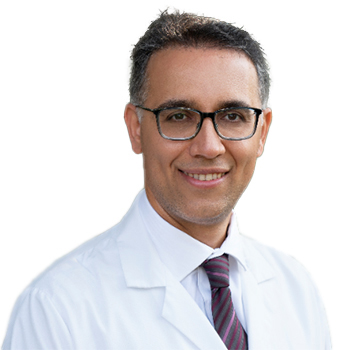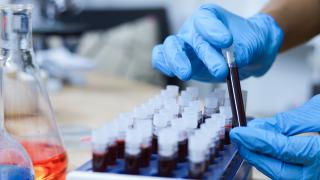Growing up in Iran, hematologist-oncologist Salman Otoukesh, M.D., always knew he wanted to be a physician. Inspired by his father, a pediatric nephrologist and professor still working in Iran, Otoukesh discovered his passion for medicine early on.
When not reading fiction or exploring the outdoors with his siblings and friends, “I would frequently follow my father in the hospitals and enjoyed his interactions with patients,” he recalled.

“I was inspired by how he would try to keep updated with medicine by constantly reading and researching. Throughout my years of medical school and then after, I have had the added privilege of observing other esteemed attending clinicians, one of whom has since become my father in-law," he said. "I believe these experiences gave me a template for my future career as a physician. I learned how a work of heart can pay off in personal fulfillment.”
Otoukesh received his medical degree from Tehran’s Shahid Beheshti University of Medical Sciences. He completed several rotations in different specialties, and found he was particularly drawn to hematology and oncology.
“The field is powerfully exciting to me, with its multidimensional growth,” he said. “I enjoy the challenge.”
Because he graduated in the top 5% of his medical school class, Otoukesh was able to receive training in his chosen specialty at one of the largest medical research and treatment centers in Tehran. He spent two years there, focusing on hematologic and oncologic conditions, and this prestigious opportunity would go on to change the course of his career.
Treating Refugees
Because Iran is a hub for refugees from neighboring countries, the hospital where Otoukesh worked treated many. Most arrived in Iran with almost nothing — no jobs, money or insurance — making it difficult to access necessary medical treatment. The United Nations helped these refugees receive care without cost to meet this need.
Otoukesh knew he eventually wanted to practice medicine in the United States, so he began the rigorous process of preparing for the U.S. medical licensing and residency exams. He was also passionate about humanitarian work and committed to helping the underserved, so he joined the United Nations High Commissioner for Refugees as head of Iran’s medical unit at the same time.
“That was a very unique experience that I still enjoy thinking about,” he said. “In my role as the supervisor within this specific program called CISAMAP, or Community Integrated Social and Medical Assistant Program, I would review, monitor, and evaluate health activities for over 100 hospitals in various provinces, encompassing every single refugee camp within the country,” he said.
Following over two years of service in this role, Otoukesh left to practice medicine in the U.S., but the impact of his time at the UN remains.
“A couple of times, out of nowhere, I got messages with pictures and updates from some of the families I was fortunate enough to help. For example, the mother of a former patient, now living in Finland, found my number and called to say that she appreciated everything I did for her. Her child was successfully treated for a rare disease and is now healthy and growing up. Moments like this make all the difference,” he said.
After six years in practice in Iran, the bilingual (English/Farsi) Otoukesh arrived in the United States, where he advanced his training with a residency in internal medicine at Texas Tech University of Health Sciences Center in El Paso, Texas, where he served as chief resident, and a hematology/oncology fellowship at Loma Linda University Health in Loma Linda, California.
Seeking Cures for Rare Cancers
Otoukesh’s next stop was City of Hope, where he completed a stem cell transplantation fellowship and is presently an assistant professor in the institution’s Division of Leukemia in the Department of Hematology & Hematopoietic Cell Transplantation.
Specializing in leukemia, “I am fascinated by all that City of Hope does in facing the challenges presented by this complex disease,” he said. “We are constantly striving for out-of-the-box thinking, and every day, hope is on the treatment horizon for the ones most in need,” he said.
“I came here to obtain more experience in the field, where medication or an idea can come into being and travel from research bench to clinical trials, from trials to approval, and then begin to save lives. I also really respect and value being close to the pioneers in such areas as bone marrow transplantation, drug development and the CAR T cell programs,” he added.
City of Hope is a global leader in the study and treatment of blood cancers, and Otoukesh is currently running a clinical trial for patients afflicted with one of the rarest types.
“I am humbled to be the principal investigator in a first-in-human vaccine trial for a subgroup of patients with myeloproliferative neoplasm. The study is being run internationally, and City of Hope is the first institution in the world to start enrollment for this trial. We have accrued the highest number of patients among all contributing institutions,” he said.
Close Bonds
In addition to his research, Otoukesh finds fulfillment working with his patients, who he treats like family.
“We will often get the most complex cases the other centers struggle to handle,” he said. “The bond and love that I feel for my patients is like we are all part of one family. I view each patient as special,” he explained.
“With transplant patients, for example, we go through many steps. Preparing them for the procedure, making sure we are giving them the right amount of medication with the least toxicity, finding a donor, going through the transplant and its aftermath. We are there with the patient throughout every step. And this creates a bond with my patients that I see as a great privilege.”
Because of all of this, it can be difficult to navigate situations where patients do not respond well to treatment.
“When a patient has serious complications, of course, it can affect me. I’m a human. Sometimes it feels like you have to say goodbye to a family member. And that is not easy,” he said.
During the hard times, Otoukesh leans on his wife and children to help him remain grounded.
“The backbone of everything is my wife, Mona. We have walked together every step of the way. She is also a great psychiatrist with experience in the fields of transplant and oncology. We have a lot in common and can talk about our work at home. And I am thankful to my children, who constantly keep me present. Their only focus is on right here, right now,” he said.
He is excited to be part of City of Hope's family and shares its “above and beyond” philosophy. “I am truly a believer in the connection between body and soul during and after active cancer treatment,” he said, “and I found City of Hope exquisitely modeling this.”
Through all the ups and downs that come with working in oncology, Otoukesh credits his patients with keeping him engaged, inspired and dedicated to his work.
“I always carry within me the inspiration to help those experiencing the most suffering live longer and happier lives,” he added.
At City of Hope, he is doing just that.
